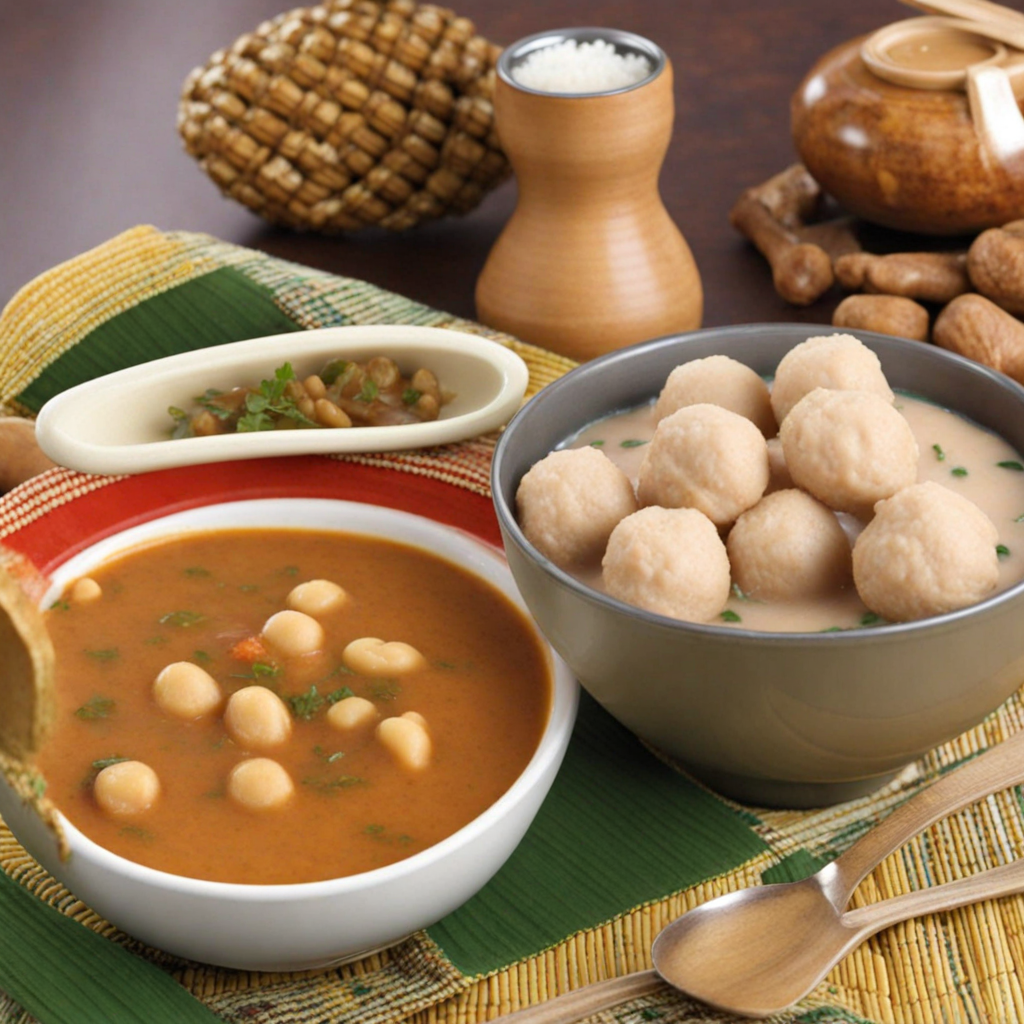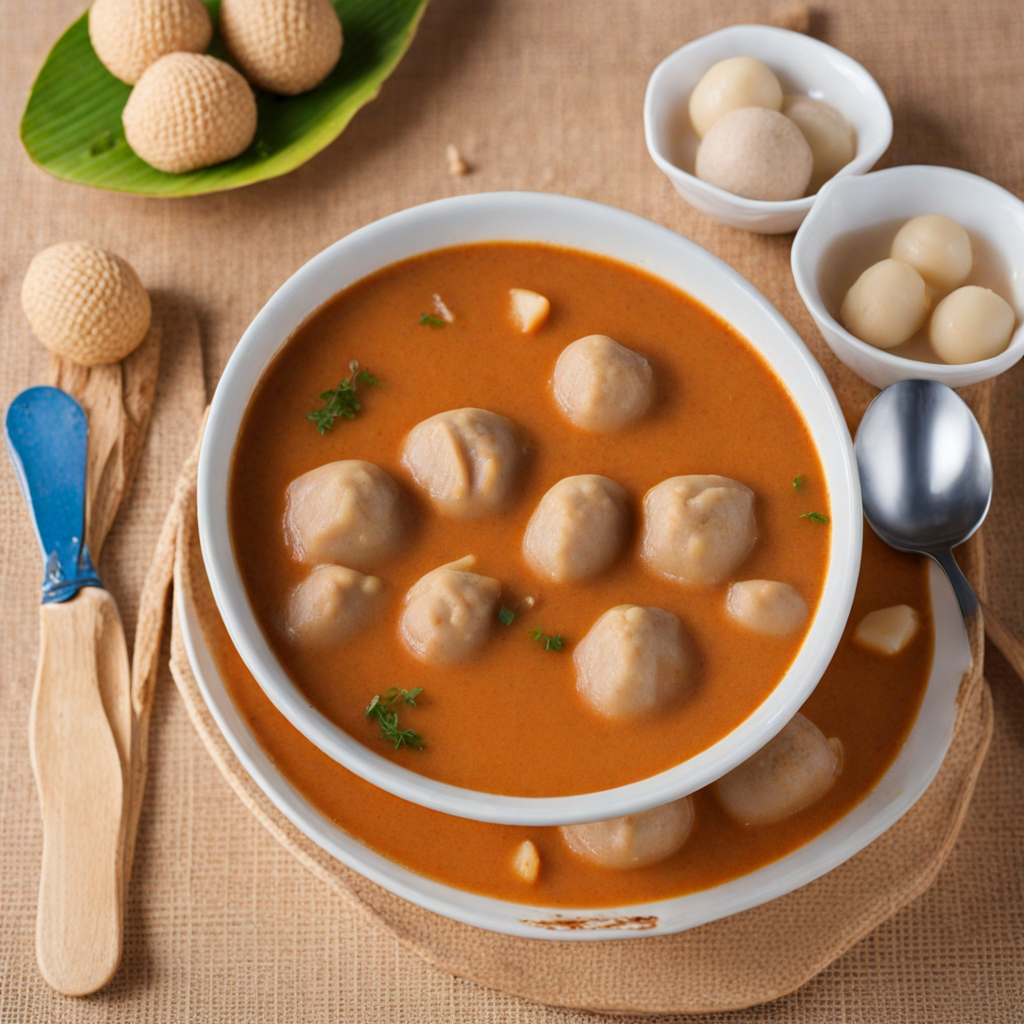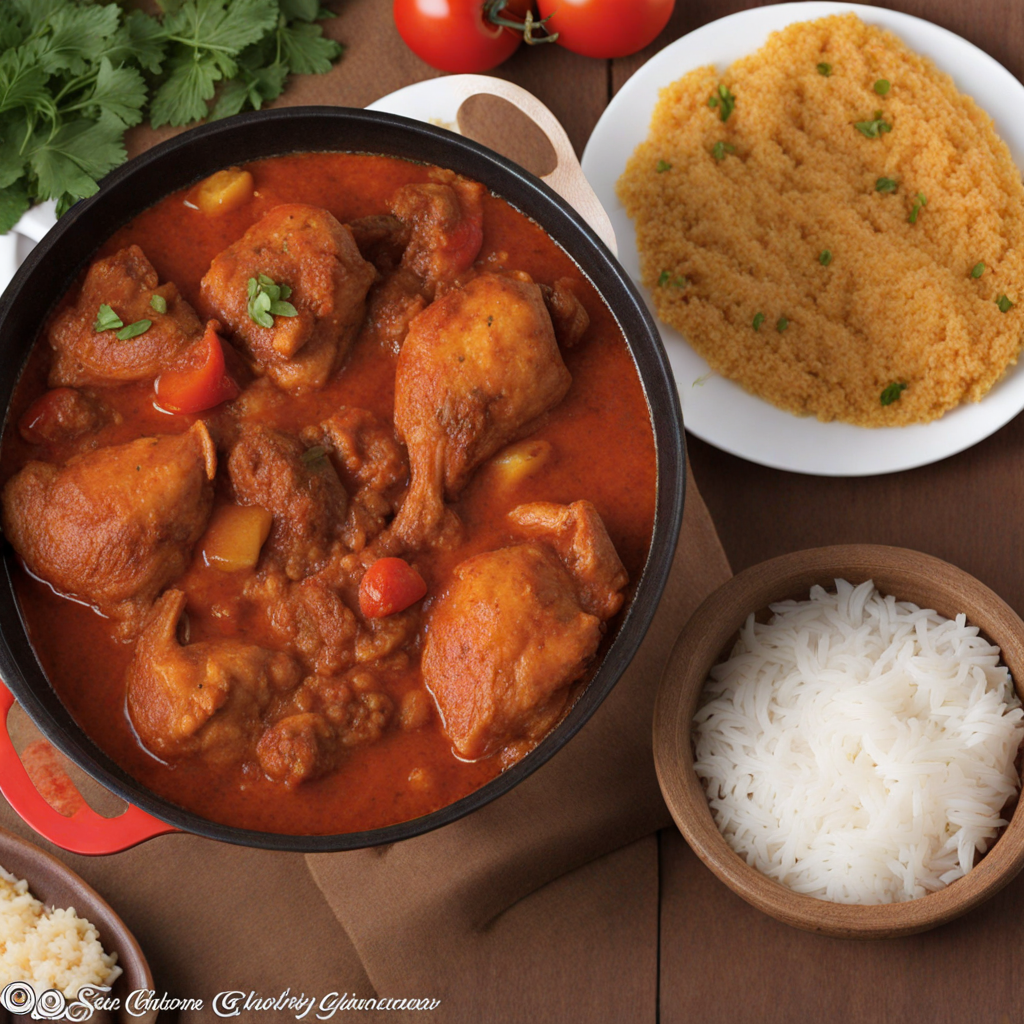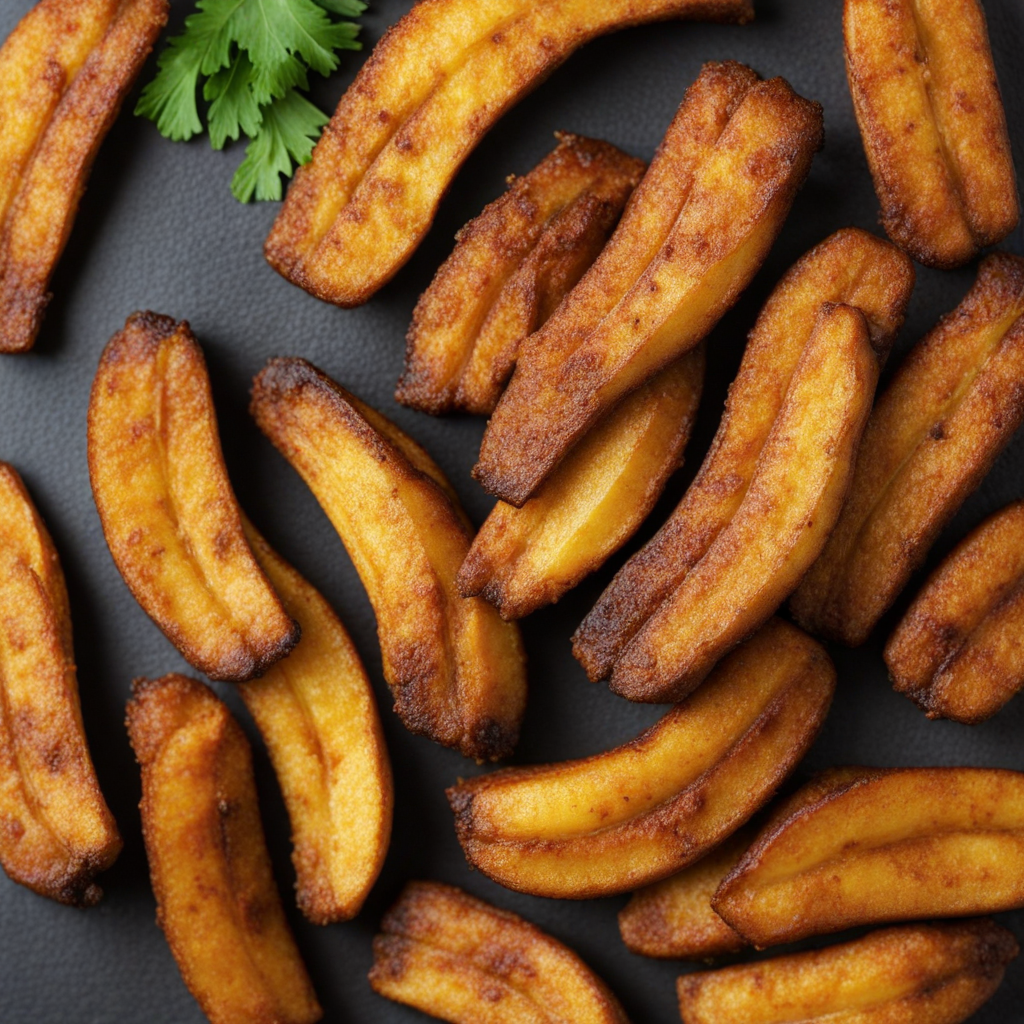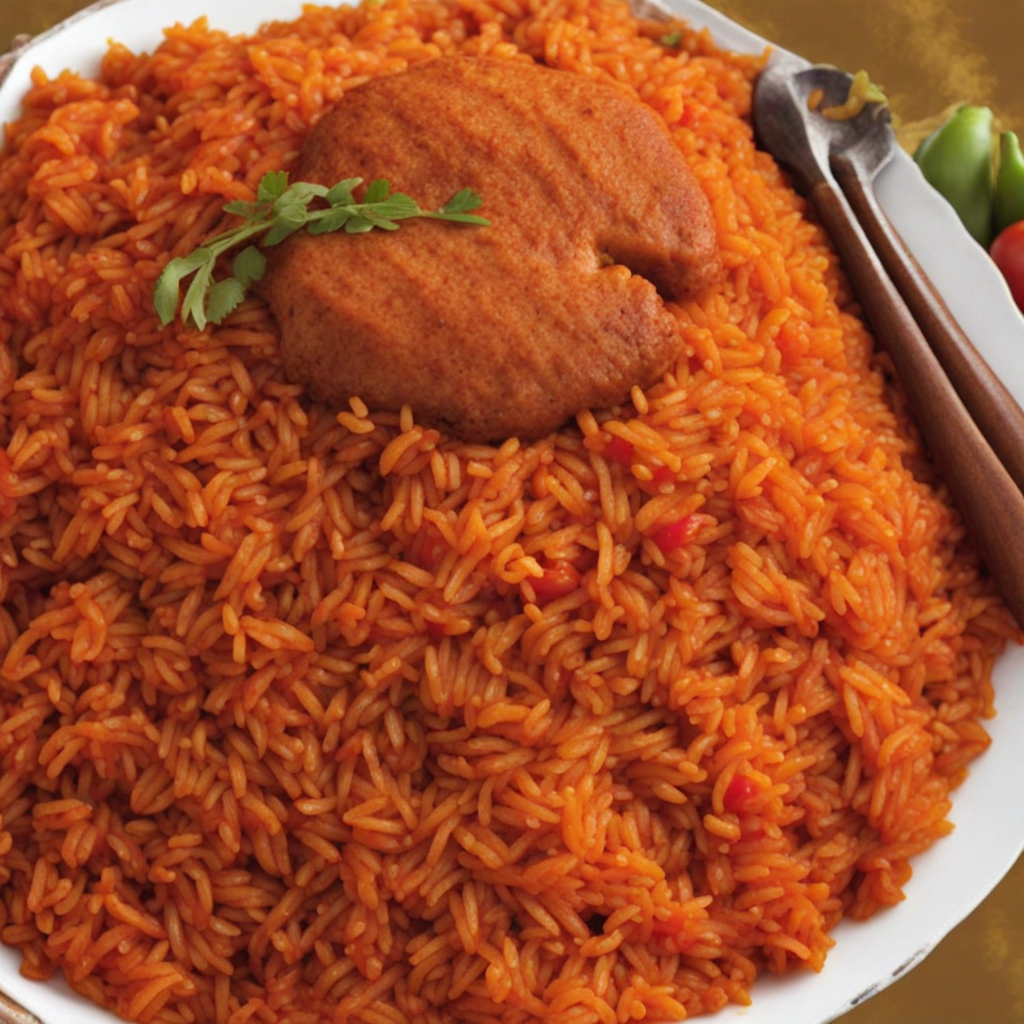Groundnut Soup
Groundnut Soup, also known as peanut soup, is a rich and creamy dish that hails from Ghana, where groundnuts (peanuts) are a staple ingredient. This hearty soup is typically made by blending roasted groundnuts into a smooth paste and combining it with a variety of spices, vegetables, and sometimes meat or fish. The result is a velvety texture that envelops the palate, offering a unique balance of nutty flavors with hints of sweetness and savory undertones. The aroma of the soup is inviting, filled with the warmth of spices like ginger, garlic, and sometimes chili, which elevate the dish and tantalize the senses. Served hot, Groundnut Soup can be enjoyed on its own or paired with fufu—a starchy side made from pounded cassava or plantains, which enhances the experience by allowing diners to scoop up the soup. The combination of the creamy, nutty base and the chewy texture of fufu creates a delightful contrast, making each bite satisfying. Additionally, variations of the soup may include proteins such as chicken, beef, or fish, which further enrich the flavor profile and make it a complete meal. This comforting dish is often enjoyed during family gatherings and celebrations, symbolizing warmth and togetherness. As you dive into a bowl of Groundnut Soup, you'll not only savor the delicious taste but also connect with the cultural significance it holds in Ghanaian cuisine. The experience is an invitation to explore new flavors and appreciate the culinary traditions that make this soup a beloved favorite among many.
How It Became This Dish
Nkate Nkwan: A Culinary Journey Through Ghana #### Origins Nkate Nkwan, often referred to as groundnut soup or peanut soup, is a beloved dish in Ghana, particularly among the Akan people. Its origin can be traced back to the introduction of the peanut (Arachis hypogaea) to West Africa. Peanuts were likely brought to the region by Portuguese traders in the 17th century, who initially encountered them in South America. The legume quickly adapted to the West African climate and became a staple crop due to its nutritional value and versatility. The dish itself is believed to have evolved from traditional soups made with local ingredients and spices, integrating the newly introduced peanut. Groundnuts soon became a significant part of Ghanaian agriculture and cuisine, flourishing alongside other staples such as maize, yams, and cassava. Over time, Nkate Nkwan emerged as a distinct culinary creation, celebrated for its rich flavor and hearty texture. #### Cultural Significance Nkate Nkwan is more than just a dish; it is a cultural emblem that reflects the agricultural practices and culinary traditions of Ghana. The soup's preparation often involves a communal effort, uniting families and friends in the kitchen. This aspect of sharing food resonates deeply within Ghanaian culture, where meals are an occasion for bonding and storytelling. Traditionally, Nkate Nkwan is served during special events and gatherings, such as weddings, festivals, and communal celebrations. The soup is often accompanied by fufu—a starchy side dish made from pounded cassava and plantains—or rice balls. This combination not only enhances the meal's flavor but also provides a complete nutritional profile, making it a hearty option for both everyday consumption and festive occasions. In many Ghanaian households, the preparation of Nkate Nkwan is passed down through generations, with each family adding its unique twist to the recipe. It serves as a canvas for creativity, allowing cooks to experiment with varying ingredients, such as meats, fish, or vegetables, which can be included based on personal preference or availability. This adaptability has helped Nkate Nkwan maintain its relevance in the ever-evolving landscape of Ghanaian cuisine. #### Ingredients and Preparation The core ingredient of Nkate Nkwan is groundnuts, which are roasted and ground into a smooth paste. The preparation begins with the roasting process, where the nuts are heated to bring out their natural oils and enhance their flavor. After roasting, the peanuts are ground into a paste, often using a mortar and pestle or a food processor. The soup is typically flavored with a variety of spices and aromatics, including onions, garlic, ginger, and chili peppers. These ingredients are sautéed in palm oil or other cooking oils to create a fragrant base. Depending on the recipe, meat—such as chicken, goat, or beef—or fish can be added, providing a rich depth of flavor. The groundnut paste is then incorporated into the soup, thickening it and imparting a creamy, nutty taste. One of the unique aspects of Nkate Nkwan is its ability to showcase regional variations. In the northern regions of Ghana, the soup may be spiced with local herbs and served with rice balls, while southern variations might lean on the use of fresh, locally sourced vegetables. Each version tells a story of place, culture, and the availability of ingredients, highlighting the diversity of Ghanaian culinary practices. #### Development Over Time As Ghanaian society has evolved, so too has the preparation and presentation of Nkate Nkwan. The dish has transcended its traditional roots and found its way onto modern restaurant menus, often reimagined for contemporary palates. Chefs in urban settings have begun to experiment with fusion techniques, incorporating international flavors while maintaining the essence of the original recipe. In recent years, there has been a growing interest in the health benefits of Nkate Nkwan due to the nutritional profile of peanuts. Groundnuts are a rich source of protein, healthy fats, and essential vitamins, making them a valuable addition to a balanced diet. This awareness has led to an appreciation for Nkate Nkwan as a nutritious meal, further solidifying its place in both traditional and modern Ghanaian cuisine. The globalization of food culture has also played a role in the dish's development. As Ghanaians migrate and settle in different parts of the world, Nkate Nkwan has become a culinary ambassador, helping to introduce the flavors of Ghana to a broader audience. Many Ghanaians living abroad have adapted the recipe to include locally available ingredients, ensuring that Nkate Nkwan continues to be a source of comfort and nostalgia. #### Conclusion Nkate Nkwan stands as a testament to Ghana's rich culinary heritage, embodying the interplay between tradition and innovation. Rooted in the history of the peanut's introduction to West Africa, this dish has evolved through cultural significance and communal practices to remain a staple in Ghanaian households. Its ability to adapt while retaining its core essence speaks to the resilience and creativity of Ghanaian cuisine. As Nkate Nkwan continues to be enjoyed at family gatherings, celebrations, and in restaurants, it serves as a reminder of the importance of food in forging connections and preserving cultural identity. Whether enjoyed in a bustling city or a quiet village, Nkate Nkwan remains a cherished dish that nourishes both the body and the soul, weaving together the stories of those who prepare and share it.
You may like
Discover local flavors from Ghana


